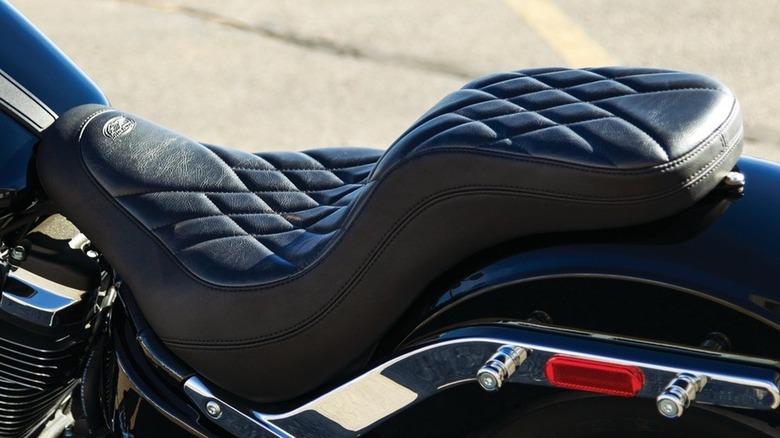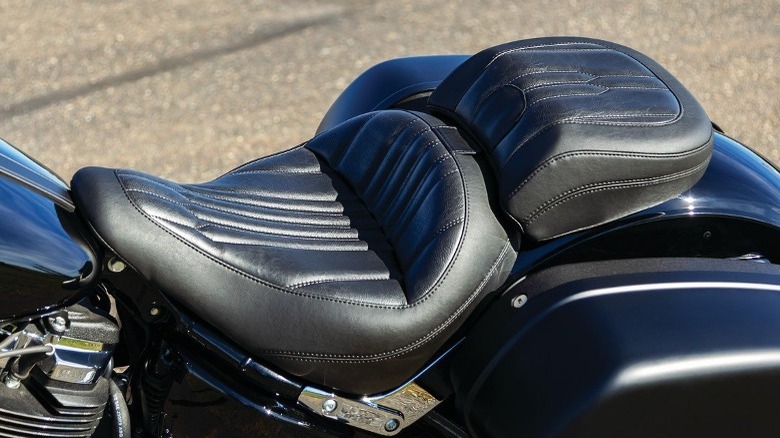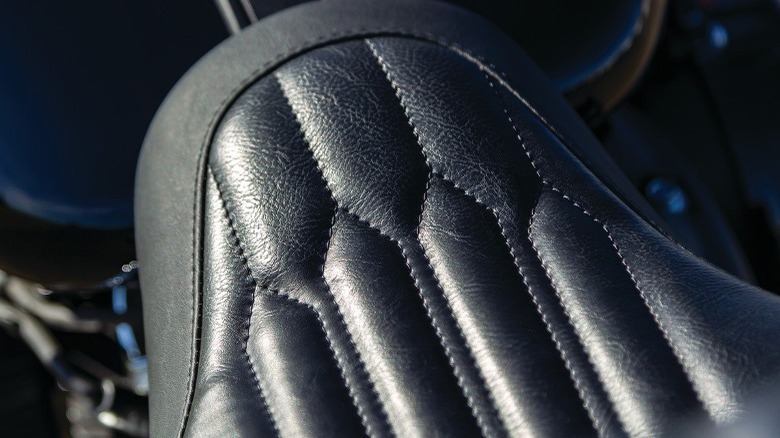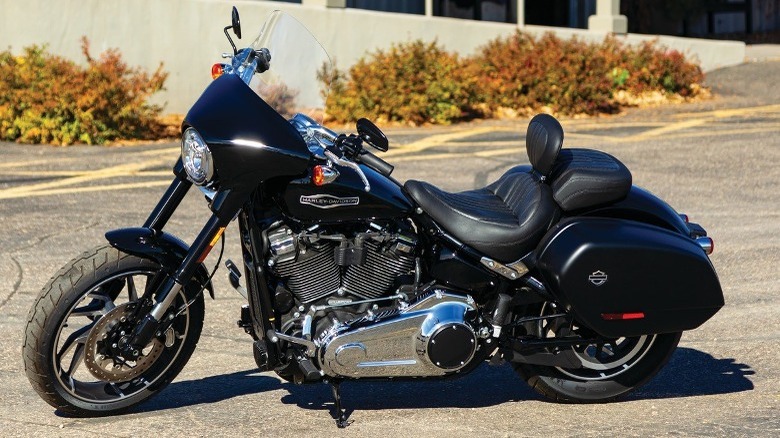Who Makes Mustang Motorcycle Seats & Are They Any Good?
There are a lot of cool ways to customize your motorcycle with aftermarket parts, and one of the simplest and easiest ways to improve comfort is to swap out the stock seat for a really nice third-party alternative — in fact, it's a must-have accessory for long-distance rides. There are plenty of companies that make these, many of them specializing in different types of motorcycles, different types of padding, and different types of upholstery. Some even make luxury seats that combine both comfort and style.
One such company, Mustang, has gained a lot of popularity as a manufacturer and purveyor of luxury imitation leather seats that fit a wide range of cruiser and touring bikes. All you have to do is look at the company's website, and you will see dozens of beautiful stitched leather upholstered pads. These seats aren't cheap, however; most of them run somewhere in the $300 to $500 range, which puts them well on the expensive end of things, even when compared to other quality aftermarket seats. Mustang's products might look nice online, but you probably want to learn a little bit more about the company that makes them and their actual quality before you commit to spending hundreds of dollars on one.
Mustang is a Massachusetts company
Mustang Motorcycle Products LLC was founded by an engineer named Al Simmons in 1980. Al moved to Massachusetts when he attended school at the University of New Haven. He briefly moved back to his home state of Connecticut, which is where he initially founded his business, then decided to move the company back across state lines, as its primary facilities are now based in Three Rivers, Massachusetts. The company started out small, but has since grown into one of the most prolific manufacturers of aftermarket motorcycle seats. Simmons died in 2022 at the age of 75, just as he was crossing the finish line of the IronMan competition in Panama City, Florida.
Just months before Simmons passed, Mustang Motorcycle Parts LLC was purchased by the investment firm LDR Growth Partners, which owns several other engineering and manufacturing businesses such as Whitman Controls, Cincinnati Radiator, Ohio Heat Transfer, and Thomas Products Flow & Level Sensors. This purchase kept the original team and factory the same while offering investment for Mustang to expand its reach. "The leadership and employees here at Mustang couldn't be happier about the news," Mike Cornelius, GM of Mustang, claimed in a press release published at the time of the acquisition. "The additional investment from LDR will help us take the next step forward. Our orders show that riders want Mustang Seats and our team is excited to continue to deliver them to our loyal dealers and customers."
How Mustang motorcycle seats are made
There are two kinds of aftermarket motorcycle components: the kind designed to be cheaper than the stock parts, and the kind designed to be better than the stock parts. Mustang Seats puts its products in the latter category largely due to the way they're made. Starting with the baseplate, Mustang Motorcycle Seats uses one of two materials depending on the kind of bike the product is designed to go on. Harley-Davidson seat baseplates, for example, are made of black epoxy powder-coated 16-gauge steel. Seats made for bikes from all other manufacturers have baseplates made with 3/16-inch thick marine-grade fiberglass, which is finished in a high gloss gel coat. Baseplates made from either material come with steel-reinforced vinyl trim on the edges to absorb impact and protect the seat cover. They also have built-in wings to provide added support to the rider.
The padding, meanwhile, is made of a custom compounded polyurethane foam that has a density of roughly 4 pounds per cubic foot. According to the company's website, "Each Mustang foam is formulated and cast to be soft enough for comfort and resilient enough to stand up to those 'thousand-mile' days." Put simply, the foam is designed to be firm, but not uncomfortably so. Finally, there's the upholstery. All of the covers for Mustang motorcycle seats are cut and twice-sewn individually in the company's facility in New England. They are made of expanded vinyl and are designed to be visually indistinguishable from black leather while being even more weather-resistant and durable, according to the company.
Many motorcycle riders like Mustang seats
Mustang makes aftermarket seats for some of the biggest major motorcycle brands in the world. Harley-Davidson, Indian Motorcycle, Victory Motorcycle, Suzuki, Kawasaki, and Honda all have fan-operated forums where users have deliberated whether Mustang seats are worth the investment. You can never expect unanimous agreement on any motorcycle product, but the overall consensus is that these seats live up to their reputation. Many reviews agree that the cushioning is comfortable and good for hours of riding. Users also largely agree that Mustang's seats are attractive and well-made, with several owners pointing out that the thicker and denser padding result in less heat transfer from the engine compartment.
The main point of contention is the posture imposed by the seats, however, as Mustang seats are designed to keep riders in a closer and more upright riding position than most stock seats. This is supposed to be a more comfortable riding posture, but some users don't care for it. Rider Magazine wrote an independent review of Mustang's Wide Vintage Motorcycle Seat, finding that "the Wide Vintage Seat [is] much more comfortable overall than the stock unit." This, coupled with the products' generally high scores on sites like Amazon and RevZilla, makes it clear that even though Mustang Motorcycle Seats may not be for everyone, they are quality-made products that, for many motorcycle owners, justify the bit of added expense.



